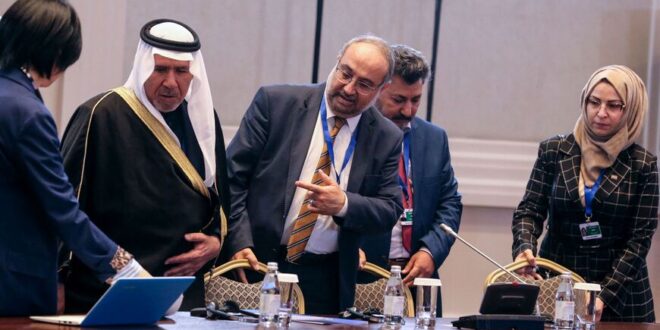Syrian president sees no need to compromise, while UN representative admits ‘comprehensive solution is not doable.’
The 20th round of the Astana peace talks kicked off in the Kazakh capital Astana today with normalization between Turkey and Syria high on the agenda.
However, there were few signs of progress, as Ayman Sousan, Syria’s assistant foreign minister, repeated his president’s line that ties with Turkey could not be mended until Ankara fully withdraws its forces from large swathes of northeast Syria that amount to nine percent of the country’s total land mass.
Syria’s President Bashar al-Assad is feeling buoyed by his recent reintegration into the Arab League and is apparently in no mood for compromise, despite pressure from the Kremlin to shake hands with Ankara — and “least of all on Turkey’s terms,” said Hamidreza Azizi, a visiting fellow at the German Institute for International and Security Affairs. But he is also desperately in need of cash, and Gulf nations, led by Saudi Arabia, want Assad to lessen his dependence on Iran. Peace with Ankara may help serve that purpose, as well as reducing Turkey’s presence in Syria over time.
Turkey was represented by its new deputy foreign minister, Burak Akcapar. Russian Deputy Foreign Minister Mikhail Bogdanov and Ali-Asghar Khaji, senior assistant to Iran’s foreign minister, also took part, alongside Ahmed Touma, the head of the Saudi-backed Syrian opposition. Geir Pederson, the United Nations’ special envoy for Syria, and officials from Jordan, Iraq, and Lebanon came as observers.
Pederson’s presence signals the UN’s desire to have a hand in the talks, if only to steer it in line with Resolution 2254, which calls for a negotiated end to the Syrian conflict. Pederson, however, acknowledged in a recent interview with Ibrahim Hamidi of the London-based Arab publication Al Majalla, that “for the time being a comprehensive solution is not doable,” and therefore an incremental approach which placed the needs of the Syrian people first was in order. Pederson noted that “key Arab players have a strong interest to work with the UN on this.” He called Arab engagement an “opportunity that must be seized,” but he did not elaborate.
For Bogdanov the quadrilateral meeting between Turkey, Syria, Russia and Iran to outline a path for Syrian-Turkish normalization was “the most important meeting” of the two day talks. “This is a very crucial process. We have had a backlog of issues for 12 years,” Bogdanov asserted, recalling that the foreign ministers of the quartet had met in Moscow in May.
The Astana talks were initiated by Turkey, Iran and Russia, ostensibly to end the 12 year-long Syrian conflict but in effect to manage their differences in Syria. All three gradually consolidated their zones of influence, with Turkey ceding control of Sunni-rebel-held territory to the regime — apart from the northwestern province of Idlib, where Sunni extremists of Hayat Tahrir al Sham(HTS) rule. Turkish forces are supposed to be rolling them back but have established a tactical alliance with them instead. The HTS is alongside the Kurdish-led Syrian Democratic Forces in the northeast, the most powerful and cohesive rebel group in Syria.
Any deal between Syria and Turkey would likely be centered on Damascus helping to crush the Kurds’ statelet that is protected by US Special Operations Forces in exchange for Ankara pulling its support for the HTS. At the same time, Turkey wants Syria to take back almost four million Syrian refugees. Neither goal seems realistic. The HTS plays a critical role in keeping more Syrians out of Turkey. Should the regime launch a full-scale attack on Idlib, the jihadis will have zero incentive to do so — and the last thing Erdogan needs with nationwide municipal elections in March is more Syrians.
Azizi believes Astana has “outlived its purpose and function,” and has been “reduced to a setting where Iran and Russia are trying to promote normalization between Turkey and the Assad regime.”
 Eurasia Press & News
Eurasia Press & News



